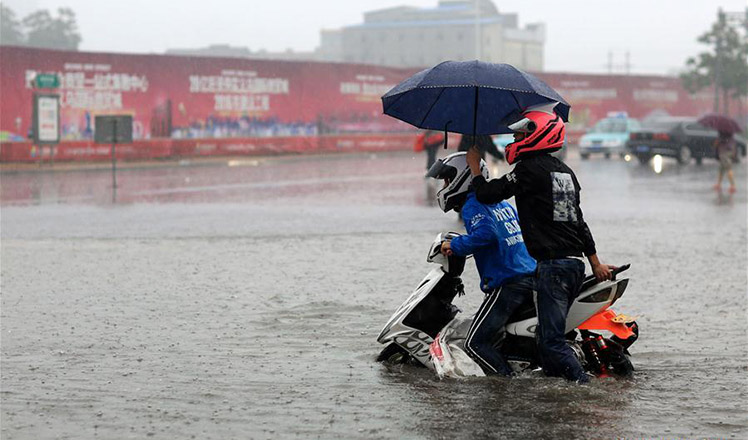Taiwan suffers drop in mainland visitors
Updated: 2016-07-25 08:00
By Li Zhenguang(China Daily)
|
||||||||
 |
|
A tour bus catches fire on highway to the Taiwan Taoyuan International Airport in Taiwan, July 19, 2016. [Photo by China Times/Asianewsphoto] |
The drop in the number of Chinese mainland tourists to Taiwan since the island's new leader Tsai Ing-wen took office two months ago has dealt a blow to its tourism industry. And the death of 24 mainland tourists in a bus fire on July 19 is likely to deal another blow to Taiwan's tourism industry. The driver and a tour guide, both Taiwan residents, also died in the fire. Since loose management of the industry and obsolete equipment should be blamed for the tragedy, more mainland tourists are likely to abandon the idea of visiting the island.
True, Zhang Zhijun, head of the State Council Taiwan Affairs Office, has said there are no "quota" restrictions on person-to-person exchange across the Taiwan Straits, but many mainland residents' decision not to visit the island can still be attributed to Tsai's reluctance to accept the 1992 Consensus and its core principle of one China.
In fact, this could be just the beginning of Taiwan's struggle to lure mainland visitors. Although Tsai's Democratic Progressive Party has proposed a seemingly feasible alternative of expanding the island's Southeast Asian markets, the mainland's economic significance for Taiwan is irreplaceable in the near future.
Thanks to the eight-year-long peaceful development of cross-Straits ties, a record number (more than 4 million) of mainland residents visited Taiwan last year, accounting for almost 40 percent of all tourists to the island.
People whose livelihoods depend on tourism in Taiwan, from snack and souvenir vendors to ferry owners and caterers, are suffering for no fault of their own, and they could be in for a bigger shock if the number of mainland tourists declines further.
Besides, the island's supplies of agricultural and fishery products to the mainland are also dropping sharply. Groupers, which command high economic value, are no longer as popular on the mainland, which is a blow to Taiwan fishermen because they sold about 80 percent of their catch across the Straits. Just a year ago, mainland residents consumed more than 21,000 tons of groupers worth nearly 6 billion new Taiwan dollars ($187 million), but this year the supply has dropped by at least by one-third, causing a loss of more NT$ 1.5 billion.
Taiwan leaders' plan to encourage local residents to spend more on export-oriented products and travel more across the island is unlikely to offset the island's economic loss, because its economy is and will be highly dependent on the mainland. Cross-Straits trade can contribute a surplus of tens of billions of dollars for the island's economy, and create a large number of jobs and increase investment.
A more daunting task for the two sides is to resume their benign economic exchanges. A series of service and trade agreements signed by the two sides years ago are yet to take effect because of the DPP's opposition and some political developments on the island. Even some deals reached on the basis of the 1992 Consensus have not been fully implemented, which has further thwarted Taiwan's efforts to play a role in regional economic integration.
Moreover, the Republic of Korea has emerged as a strong rival of Taiwan in the mainland market after initiating a free trade agreement with the mainland last year-and the fact that the ROK's share in the mainland market rose to a record 11.3 percent should be a cause for Taiwan to worry.
The mainland residents' unwillingness to visit Taiwan and the economic blow to the island has everything to do with the DPP's refusal to acknowledge the one-China principle. As such, the key to improving Taiwan residents' livelihoods is in the hands of the island's new leadership.
The author is a professor at the Institute of Taiwan Studies, Beijing Union University.
- Taiwan leader shows her true colors by refusing to accept 1992 consensus
- Taiwan leader hedges on Consensus
- Mainland officials leave for Taiwan for bus accident aftermath
- 26 killed in Taiwan bus fire accident
- What caused the Taiwan bus fire?
- 26 die after tour bus catches fire on highway in Taiwan
- Mainland stresses one-China principle in relations with Taiwan
- Fashion of Queen Elizabeth on exhibition in London
- Hollande urges Britain to begin EU exit talks 'as soon as possible'
- Trump vows law and order if elected
- Chinese cuisine stuns Thai princess
- Security Council holds first secret poll on next UN chief selection
- Turkey's Erdogan declares state of emergency after coup bid

 Things you may not know about Major Heat
Things you may not know about Major Heat
 Unveiling the secrets of Elizabeth II’s wardrobe
Unveiling the secrets of Elizabeth II’s wardrobe
 Go global: Wanda's top 10 foreign acquisitions
Go global: Wanda's top 10 foreign acquisitions
 Hot pepper and ice tub challenge held in E China
Hot pepper and ice tub challenge held in E China
 Ten photos from around China: July 15 – 21
Ten photos from around China: July 15 – 21
 Heavy rain, floods across China
Heavy rain, floods across China
 Super-sized class has 3,500 students for postgraduate exam
Super-sized class has 3,500 students for postgraduate exam
 Luoyang university gets cartoon manhole covers
Luoyang university gets cartoon manhole covers
Most Viewed
Editor's Picks

|

|

|

|

|

|
Today's Top News
Ministry slams US-Korean THAAD deployment
Two police officers shot at protest in Dallas
Abe's blame game reveals his policies failing to get results
Ending wildlife trafficking must be policy priority in Asia
Effects of supply-side reform take time to be seen
Chinese State Councilor Yang Jiechi to meet Kerry
Chinese stocks surge on back of MSCI rumors
Liang avoids jail in shooting death
US Weekly

|

|








